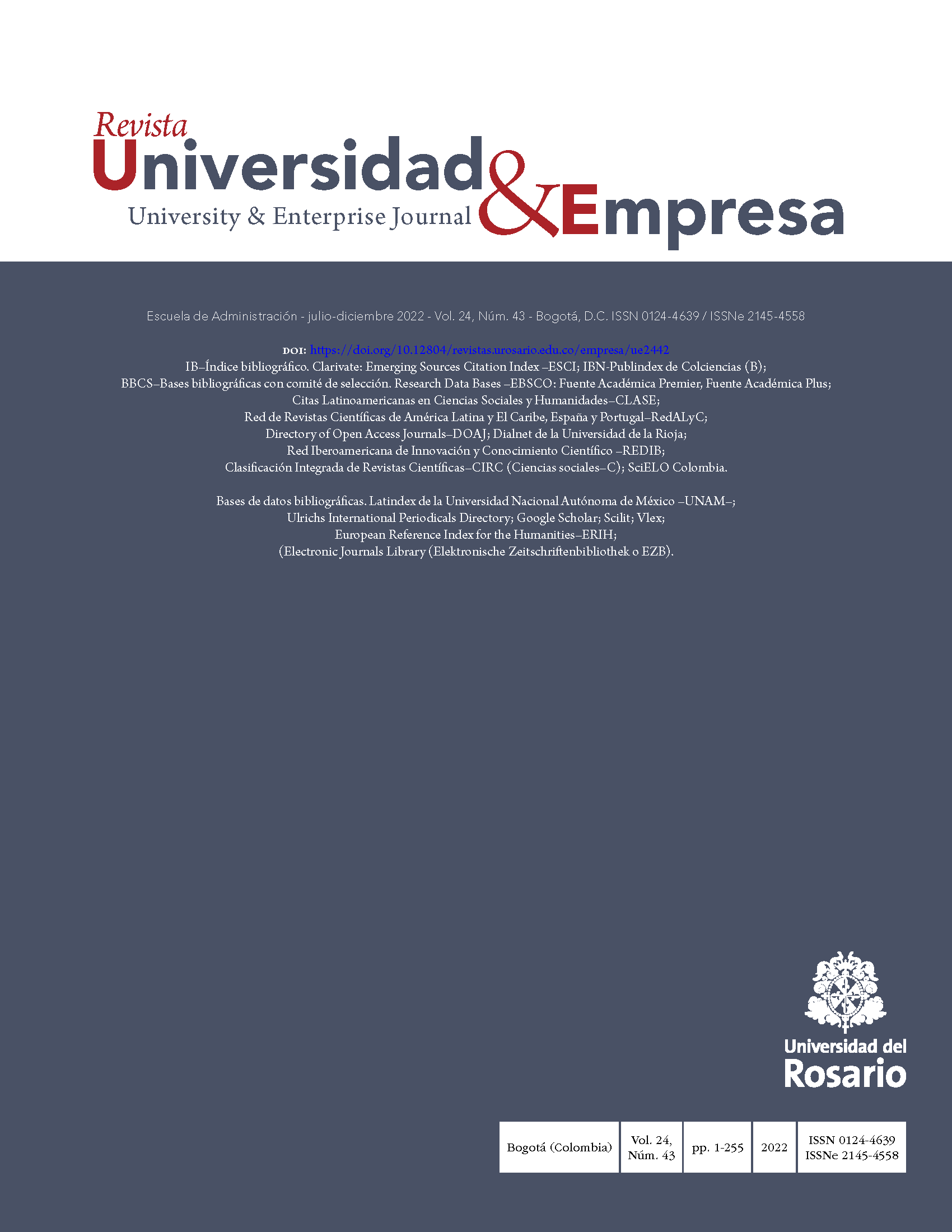Ecosistemas de emprendimiento: hacia una reflexión práctica y conceptual
Barra lateral del artículo
Contenido principal del artículo
En la última década, la definición “ecosistemas de emprendimiento” ha cobrado gran relevancia dentro de los procesos de investigación relacionados con el campo de la gestión y los negocios. En este sentido, el término ha sido utilizado en numerosos documentos de diversa índole, para describir la interacción de aspectos políticos, sociales, económicos, culturales y ambientales que permiten el desarrollo de la actividad emprendedora en una región determinada. Su rápida adopción por parte de la comunidad académica ha llevado a que, en algunos casos, el término haya sido usado arbitrariamente para denominar cualquier tipo de fenómeno colectivo de emprendimiento, así este no guarde ninguna similitud con un ecosistema propiamente dicho. En consecuencia, el presente artículo condensa buena parte de la bibliografía existente sobre el tema a partir de una revisión sistemática de documentos; introduce los aspectos más destacados del concepto para tratar de dilucidar qué es un ecosistema de emprendimiento; y propone una discusión en torno a la importancia y las limitaciones que enfrenta este campo de estudio tanto a nivel académico como de aplicación práctica.
Descargas
Camilo Alberto Cuartas Torres, Universidad Nacional de Colombia
Magíster en Administración; Administrador de Empresas. Universidad Nacional de Colombia Sede Manizales.
Profesional de la Dirección Académica. Universidad Nacional de Colombia Sede Manizales.
Manizales, Caldas, Colombia
Pablo Felipe Marín Cardona, Universidad Nacional de Colombia
Doctor en Ingeniería - Industria y Organizaciones; Magíster en Administración; Administrador de Empresas. Universidad Nacional de Colombia Sede Manizales.
Director Académico de Sede - Profesor Tiempo Completo de la Facultad de Administración. Universidad Nacional de Colombia Sede Manizales.
Manizales, Caldas, Colombia
Aldrich, H. E., & Browder, R. E. (2020). Makerspaces and entrepreneurial ecosystems. Collective
action problems in makerspaces ecosystems: the relative roles of design and emergence.
University of North Carolina at Chapel Hill-University of Oklahoma. https://www.researchgate.
net/publication/342338685_Makerspaces_and_Entrepreneurial_Ecosystems
Audrestsch, D., & Belitski, M. (2017). Entrepreneurial ecosystems in cities: establishing the
framework conditions. The Journal of Technology Transfer, 42(5). https://doi.org/10.1007/
s10961-016-9473-8
Audrestsch, D., Mason, C., Morgan, M., & O’Connor, A. (2021). Time and the dynamics of entrepreneurial ecosystems. Entrepreneurship & Regional Development, 33(1-2), 1-14.
Auerswald, P. E., Acs, Z., Florida, R., Schramm, C., Stangler, D., Walshok, M., Zeckhauser, R.,
Kauffman, S., Lobo, J., Shell, K., Branscomb, L., Krueger, N., Maxey, S., Mocker, V., Morris,
R., Ortmans, J., & Stefanotti, J. (2015). Enabling startup ecosystems. The Ewing Marion
Kauffman Foundation.
Autio, E. (2021). Orchestrating ecosystems: a multilayered framework. Innovation: Organization & Management, 24(3), 1-14. https://doi.org/10.1080/14479338.2021.1919120
Autio, E., Kenney, M., Mustar, P., Siegel, D., & Wright, M. (2014). Entrepreneurial innovation:
the importance of context. Research Policy, 43(7), 1097-1108. https://doi.org/10.1016/j.respol.2014.01.015
Barrera Martínez, C. (2015). The role of the most representative Spanish public universities
in the entrepreneurial ecosystem [trabajo de grado, Universidad de La Laguna, Tenerife, España]. https://riull.ull.es/xmlui/bitstream/handle/915/2832/Elpapeldelasuniversidadespublicasespanolasmasrepresentativasenelecosistemaemprendedor.pdf?sequence=1&isAllowed=y
Bouncken, R. B., & Kraus, S. (2022). Entrepreneurial ecosystems in an interconnected world:
emergence, governance, and digitalization. Review of Managerial Science, 16(1), 1-14.
https://doi.org/10.1007/s11846-021-00444-1
Brown, R., & Mason, C. (2017). Looking inside the spiky bits: a critical review and conceptualisation of entrepreneurial ecosystems. Small Business Economics, 49(1), 11-30. https://doi.org/10.1007/s11187-017-9865-7
Bruns, K., Bosma, N., Sanders, M., & Schramm, M. (2017). Searching for the existence of entrepreneurial ecosystems: a regional cross-section growth regression approach. Small
Business Economics, 49(1), 31-54. https://doi.org/10.1007/s11187-017-9866-6
Chatterji, A., Glaeser, E., & Kerr, W. (2013). Clusters of entrepreneurship and innovation.
Innovation Policy and the Economy, 14, 129-166. https://doi.org/10.1086/674023
Clarysse, B., Wright, M., Bruneel, J., & Mahajan, A. (2014). Creating value in ecosystems: crossingthe chasm between knowledge and business ecosystems. Research Policy, 43(7),
-1176. https://doi.org/10.1016/j.respol.2014.04.014
Endeavor. (2014). What do the best entrepreneurs want in a city? Endeavor Insight.
Erina, I., Shatrevich, V., & Gaile-Sarkane, E. (2017). Impact of stakeholder groups on development of a regional entrepreneurial ecosystem. European Planning Studies, 25(5), 755-
https://doi.org/10.1080/09654313.2017.1282077
Feld, B. (2012). Startup communities: building an entrepreneurial ecosystem in your city (1st
ed.). John Wiley & Sons, Inc.
Fernandes, A. J., & Ferreira, J. J. (2022). Entrepreneurial ecosystems and networks: a literature
review and research agenda. Review of Managerial Science, 16, 189-247. https://doi.org/10.1007/s11846-020-00437-6
Fischer, B., Meissner, D., Vonortas, N., & Guerrero, M. (2022). Spatial features of entrepreneurial ecosystems. Journal of Business Research, 147, 27-36. https://doi.org/10.1016/j.jbusres.2022.04.018
Garud, R., Gehman, J., & Giuliani, A. P. (2014). Contextualizing entrepreneurial innovation:
a narrative perspective. Research Policy, 43(7), 1177-1188. https://doi.org/10.1016/j.respol.2014.04.015
González Campo, C. H., & Gálvez Albarracín, É. J. (2008). Modelo de emprendimiento en Red-
MER. Aplicación de las teorías del emprendimiento a las redes empresariales. Academia.
Revista Latinoamericana de Administración, (40), 13-31. https://doi.org/http://redalyc.uaemex.mx/src/inicio/ArtPdfRed.jsp?iCve=71612100003
Gunawan, T., Jacob, J., & Duysters, G. (2015). Entrepreneurial orientation and network
ties: innovative performance of smes in an emerging - economy manufacturing cluster.
International Entrepreneurhip Management Journal, 12, 575-599. https://doi.org/10.1007/s11365-014-0355-y
Gunawan, T., Jacob, J., & Duysters, G. (2016). Network ties and entrepreneurial orientation:
innovative performance of smes in a developing country. International Entrepreneurship
and Management Journal, 12(2), 575-599. https://doi.org/10.1007/s11365-014-0355-y
Hu, H., Huang, T., Zeng, Q., & Zhang, S. (2016). The role of institutional entrepreneurship in
building digital ecosystem: a case study of Red Collar Group (rcg). International Journal
of Information Management, 36, 496-499. https://doi.org/10.1016/j.ijinfomgt.2015.12.004
Iacobucci, D., & Perugini, F. (2021). Entrepreneurial ecosystems and economic resilience at
local level. Entrepreneurship & Regional Development, 33(9-10), 689-716. https://doi.org/10.1080/08985626.2021.1888318
Isenberg, D. J. (2010). How to start an entrepreneurial revolution. Harvard Business Review,
https://doi.org/10.1353/abr.2012.0147
Julien, P.-A. (2007). A theory of local entrepreneurship in the knowledge economy. Université
du Québec à Trois-Rivières.
Karlsson, C., & Warda, P. (2014). Entrepreneurship and innovation networks. Small Business
Economics, 43, 393-398. https://doi.org/10.1007/s11187-014-9542-z
Kuratko, D. F., Fisher, G., Bloodgood, J. M., & Hornsby, J. S. (2017). The paradox of new venture
legitimation within an entrepreneurial ecosystem. Small Business Economics, 49(1), 119-140. https://doi.org/10.1007/s11187-017-9870-x
Leendertsee, J., Schrijvers, M., & Stam, E. (2021). Measure twice, cut once: entrepreneurial ecosystems metrics. Research Policy, 51(9), 1-27. https://doi.org/10.1016/j.respol.2021.104336
Lerner, J. (2013). The Boulevard of Broken Dreams: innovation policy and entrepreneurship.
Innovation Policy and the Economy, 13(1), 61-82. https://doi.org/10.1086/668239
Li, W., Du, W., & Yin, J. (2017). Digital entrepreneurship ecosystem as a new form of organizing:
the case of Zhongguancun. Frontiers of Business Research in China, 11(1), 5. https://doi.org/10.1186/s11782-017-0004-8
Lichtenstein, G. A., Lyons, T. S., & Kutzhanova, N. (2004). Building entrepreneurial communities: the appropriate role of enterprise development activities. Community Development Society Journal, 35(1), 5-24. https://doi.org/10.1080/15575330409490119
Mack, E., & Mayer, H. (2016). The evolutionary dynamics of entrepreneurial ecosystems. Urban
Studies, 53(10), 2118-2133. https://doi.org/10.1177/0042098015586547
Malecki, E. J. (2011). Connecting local entrepreneurial ecosystems to global innovation networks: open innovation, double networks and knowledge integration. International Journal
of Entrepreneurship and Innovation Management, 14(1), 36-59. https://doi.org/10.1504/IJEIM.2011.040821
Malecki, E. J (2018). Entrepreneurship and entrepreneurial ecosystems. Geography Compass,
(3). https://doi.org/10.1111/gec3.12359
Mason, C., & Brown, R. (2014). Entrepreneurial ecosystems and growth oriented entrepreneurship. OECD. https://doi.org/10.1007/s13398-014-0173-7.2
Mazzarol, T. (2014). Growing and sustaining entrepreneurial ecosystems: what they are and
the role of government policy. White Paper WP01-2014. Small Enterprise Association of
Australia and New Zealand (seaanz). http://seaanz.org/sites/seaanz/documents/reports/SEAANZ_WP_01_2014_Mazzarol.pdf
Moore, J. F. (1993). Predators and prey: a new ecology of competition. Harvard Business
Review, (May-June), 1-21. https://hbr.org/1993/05/predators-and-prey-a-new-ecology-of-competition
Neck, H. M., Meyer, G. D., Cohen, B., & Corbett, A. C. (2004). An entrepreneurial system view
of new venture creation. Journal of Small Business Management, 42(2), 190-208. https://doi.org/10.1111/j.1540-627X.2004.00105.x
O’Connor, & A., Audrestch, D. (2022). Regional entrepreneurial ecosystems: learning from
forest ecosystems. Small Business Economy, 60, 1051-1079. https://doi.org/10.1007/s11187-022-00623-8
Ratten, V. (2020). Entrepreneurial ecosystems. Thunderbird International Business Review,
(5). https://doi.org/10.1002/tie.22164
Rong, K., Shi, Y., & Yu, J. (2013). Nurturing business ecosystems to deal with industry
uncertainties. Industrial Management & Data Systems, 113(3), 385-402. https://doi.org/10.1108/02635571311312677
Roundy, P. T. (2016). Start-up community narratives: the discursive construction of entrepreneurial ecosystems. Journal of Entrepreneurship, 25(2), 232-248. https://doi.org/10.1177/0971355716650373
Spigel, B. (2017). The relational organization of entrepreneurial ecosystems. Entrepreneurship:
Theory and Practice, 41(1), 49-72. https://doi.org/10.1111/etap.12167
Spigel, B., & Harrison, R. (2017). Towards a process theory of entrepreneurial ecosystems.
Strategic Entrepreneurship Journal, 1-18. https://doi.org/10.1002/sej.1268
Spigel, B., Kitagawa, F., & Mason, C. (2020). A manifesto for researching entrepreneurial
ecosystems. Local Economy, 35(5), https://doi.org/10.1177/0269094220959052
Spigel, B., & Vinodrai, T. (2020). Meeting its Waterloo? Recycling in entrepreneurial ecosystems
after anchor firm collapse. Entrepreneurship & Regional Development, (Special Issue: The dynamics of entrepreneurial ecosystems), 599-620. https://doi.org/10.1080/08985626.2020.1734262
Stam, E. (2015). Entrepreneurial ecosystems and regional policy: a sympathetic critique.
European Planning Studies, 23(9), 1759-1769. https://doi.org/10.1080/09654313.2015.1061484
Stam, E., & Van de Ven, A. (2021). Entrepreneurial Ecosystem Elements. Small Business
Economics, 56(2). https://doi.org/10.1007/s11187-019-00270-6
Theodoraki, C., Dana, L. P., & Caputo, A. (2022). Building sustainable entrepreneurial ecosystems: a holistic approach. Journal of Business Research, 140, 346-360. https://doi.org/10.1016/j.jbusres.2021.11.005
Thompson, T., Purdy, J., & Ventresca, M. (2018). How entrepreneurial ecosystems take form:
evidence from social impact initiatives in Seattle. Strategic Entrepreneurship Journal, 1-21.
https://doi.org/10.1002/sej.1285
Tsvetkova, A., & Gustafsson, M. (2012). Business models for industrial ecosystems: a modular
approach. Journal of Cleaner Production, 29-30, 246-254. https://doi.org/10.1016/j.jclepro.2012.01.017
Vernis i Domènech, A., & Navarro Colomer, C. (2011). El concepto de ecosistema para el emprendimiento social. Revista Española del Tercer Sector, (17), 67-86.
Vicens, A. L., & Grullón, S. (2011). Innovation and entrepreneurship: a model based on entrepreneur development. Fifth Americas Competiveness Forum for the Inter-American Development Bank and Compete Caribbean.
World Economic Forum. (2013). Entrepreneurial ecosystems around the globe and company
growth dynamics. Report Summary for the Annual Meeting of the New Champions 2013,
(September), 36. http://www3.weforum.org/docs/WEF_EntrepreneurialEcosystems_Report_2013.pdf
Zahra, S. A., & Nambisan, S. (2011). Entrepreneurship and strategic thinking in business
ecosystems. Business Horizons, 55, 219-229. https://doi.org/10.1016/j.bushor.2011.12.004
Detalles del artículo

Esta obra está bajo una licencia internacional Creative Commons Atribución-NoComercial 4.0.
Los autores conservan los derechos de autor y garantizan a la revista el derecho de ser la primera publicación del trabajo al igual que licenciado bajo una Creative Commons Attribution License que permite a otros compartir el trabajo con un reconocimiento de la autoría del trabajo y la publicación inicial en esta revista.


